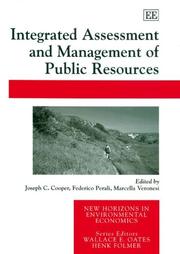| Listing 1 - 4 of 4 |
Sort by
|
Book
ISBN: 1003172741 1000826988 1003172741 1000827038 103200102X 1032003537 Year: 2023 Publisher: Oxon, UK ; New York, NY : Routledge, Taylor & Francis Group,
Abstract | Keywords | Export | Availability | Bookmark
 Loading...
Loading...Choose an application
- Reference Manager
- EndNote
- RefWorks (Direct export to RefWorks)
"Humans have long neglected to fully consider the impact of their behaviour on the environment. From excessive consumption of fossil fuels and natural resources, to pollution, waste disposal and, in more recent years, climate change, most people and institutions lack a clear understanding of the environmental consequences of their actions. The new field of behavioural environmental economics seeks to address this by applying the framework of behavioural economics to environmental issues, thereby rationalizing unexplained puzzles and providing a more realistic account of individual behaviour. This book provides a complete and rigorous overview of environmental topics which may be addressed and, in many instances, better understood by integrating a behavioural approach. This volume features state-of-the-art research on this topic by influential scholars in behavioural and environmental economics, focusing on the effects of psychological, social and cognitive factors on the decision-making process. It presents research performed using different methods and data collection mechanisms (e.g. laboratory experiments, field experiments, natural experiments, online surveys) on a variety of environmental topics (e.g. sustainability, natural resources). This book is a comprehensive and innovative tool for researchers and students interested in the behavioural economics of the environment and in the design of policy interventions aimed at reducing the human impact on the environment"--
Environmental economics. --- Economics --- Psychological aspects.

ISBN: 9781845424725 1845424727 Year: 2005 Publisher: Cheltenham: Elgar,
Abstract | Keywords | Export | Availability | Bookmark
 Loading...
Loading...Choose an application
- Reference Manager
- EndNote
- RefWorks (Direct export to RefWorks)
Natural resources, Communal --- Public lands --- Environmental economics
Book
ISBN: 9781032001029 9781032003535 9781003172741 Year: 2023 Publisher: London Routledge, Taylor & Francis Group
Abstract | Keywords | Export | Availability | Bookmark
 Loading...
Loading...Choose an application
- Reference Manager
- EndNote
- RefWorks (Direct export to RefWorks)
"Humans have long neglected to fully consider the impact of their behaviour on the environment. From excessive consumption of fossil fuels and natural resources, to pollution, waste disposal and, in more recent years, climate change, most people and institutions lack a clear understanding of the environmental consequences of their actions. The new field of behavioural environmental economics seeks to address this by applying the framework of behavioural economics to environmental issues, thereby rationalizing unexplained puzzles and providing a more realistic account of individual behaviour. This book provides a complete and rigorous overview of environmental topics which may be addressed and, in many instances, better understood by integrating a behavioural approach. This volume features state-of-the-art research on this topic by influential scholars in behavioural and environmental economics, focusing on the effects of psychological, social and cognitive factors on the decision-making process. It presents research performed using different methods and data collection mechanisms (e.g. laboratory experiments, field experiments, natural experiments, online surveys) on a variety of environmental topics (e.g. sustainability, natural resources). This book is a comprehensive and innovative tool for researchers and students interested in the behavioural economics of the environment and in the design of policy interventions aimed at reducing the human impact on the environment"--
Methodology of economics --- Environmental economics. --- Economics --- Psychological aspects.
Book
Year: 2019 Publisher: Cambridge, Mass. National Bureau of Economic Research
Abstract | Keywords | Export | Availability | Bookmark
 Loading...
Loading...Choose an application
- Reference Manager
- EndNote
- RefWorks (Direct export to RefWorks)
This paper provides novel evidence of the unintended health effects stemming from the halt in nuclear power production after the Fukushima Daiichi nuclear accident. After the accident, nuclear power stations ceased operation and nuclear power was replaced by fossil fuels, causing an increase in electricity prices. We find that this increase led to a reduction in energy consumption, which caused an increase in mortality during very cold temperatures, given the protective role that climate control plays against the elements. Our results contribute to the debate surrounding the use of nuclear as a source of energy by documenting a yet unexplored health benefit from using nuclear power, and more broadly to regulatory policy approaches implemented during periods of scientific uncertainty about potential adverse effects.
| Listing 1 - 4 of 4 |
Sort by
|

 Search
Search Feedback
Feedback About UniCat
About UniCat  Help
Help News
News